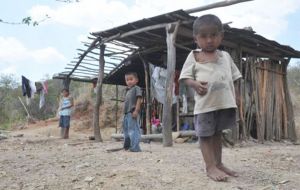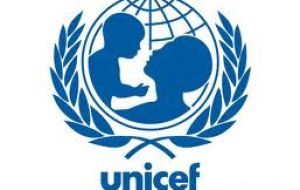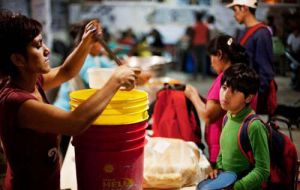MercoPress. South Atlantic News Agency
Four million Argentine children live in poverty conditions, according to Unicef
 Argentine children poverty environment: most are born to families with four to five children, minimum education parents and who mostly work in the black economy.
Argentine children poverty environment: most are born to families with four to five children, minimum education parents and who mostly work in the black economy.  However children in the north of Argentina are six times more exposed to lack of basic food, health and education care that those in Buenos Aires City.
However children in the north of Argentina are six times more exposed to lack of basic food, health and education care that those in Buenos Aires City.  Unicef also insist on the need to implement public policies that help combat informality in the work market, which is estimated at 40% in Argentina
Unicef also insist on the need to implement public policies that help combat informality in the work market, which is estimated at 40% in Argentina  Current social programs in Argentina such as child allowance leave out 1.5 million children in vulnerable conditions, claims Unicef.
Current social programs in Argentina such as child allowance leave out 1.5 million children in vulnerable conditions, claims Unicef. Almost four million children in Argentina are poor and 8.5% live in extreme poverty, according to a report from UNICEF which measures multidimensional poverty which considers 28 indicators such as nutrition, access to healthcare, exposure to violence, among other more traditional references.
The original report is from 2015 but has been updated and gives an idea of extreme poverty environment for children in Argentina: most are born to families with four to five children, minimum education parents and who mostly work in the black economy.
However children in the north of Argentina are six times more exposed to lack of basic food, health and education care that those in Buenos Aires City. Girls from families headed by women are even more dispossessed.
“These conditions are not chosen by children, they are simply born with them”, reports Sebastian Waisgrais who monitors and assesses Unicef programs. In those households where parents only have primary schooling, children are ten times more exposed to poverty conditions than those from households with parents that have attended university.
“Investing in education is a way of breaking that virtuous poverty circle”, says Florence Bauer Unicef representative in Argentina. She also insisted in the need to implement public policies that help combat informality in the work market, which is estimated at 40% in Argentina, and directly linked to child poverty.
Income inequality factor means the children at the base of the income pyramid are 13 times more exposed to suffer hardships than those in the cusp. But according to Unicef the income factor is a traditional tool to measure poverty, which means family have or don't have the capacity to fulfill basic food needs and others such as clothing and transport. But Unicef also points out that one of five children which are considered not to be or belong to poor households, because of income, certainly are lacking other indicators.
The income factor only takes into account whether the parents have an empty wallet, which leaves out of stats those families which technically cover basic money needs, but nevertheless are poor in other dimensions, points out Waisgrais. Current social programs in Argentina such as child allowance leave out 1.5 million children in vulnerable conditions. Thus Unicef recommends a review of government stats and change the focus of public policies guided to combat poverty which includes a greater umbrella of indicators.
Among the Argentine children hardships, Unicef points out the access to information technologies to which 21% are condemned; verbal violence, suffered by one in five minors and the absence of time to play. Plus the traditional aspects such as healthcare, nutritious food and housing.
Child mortality in Argentina is 13 per thousand children born alive, but 70% of those cases are 'avoidable' argues Waisgrais. In effect severe diarrhea, respiratory diseases, are most prevalent in households with no access to drinking water, overcrowding conditions and vulnerable environments such as garbage dump areas or contaminated or prone to flooding.




Top Comments
Disclaimer & comment rules-

-

-

Read all commentsI see that the contraception policy by the Catholic Church is working to bring more children into poverty. Educate the idiots that think “ coitus interuptus ” is working and that the failure to execute results in more poverty. But I suppose in the “ favelas ” there is not much else to do.
May 06th, 2016 - 09:18 am 0Argentine children live in poverty conditions,
May 06th, 2016 - 12:11 pm 0im surprised our liberal elite has not offered them a home in the UK,
they help everyone else, and sod the British homeless children.
just my opinion.
Oh children in Argentina worry not. President Macri is bringing you the Joy. Food, education, sanitary improvements? Oh, no, that's populism and Great Wizard Macri doesn't get distracted by such menial deeds. Joy should suffice.
May 06th, 2016 - 01:00 pm 0Commenting for this story is now closed.
If you have a Facebook account, become a fan and comment on our Facebook Page!